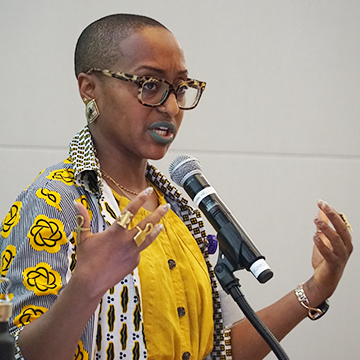Putting Communities First
Research Conference Highlights How Partnerships Can Thrive
“Whatever is not being done with communities is being done to communities,” says Glenance Green, PhD, co-founder and executive director of the Black Researchers Collective.
That message — one of many delivered by Green — helped set the tone during Northwestern University’s daylong Community-Engaged Research Conference.
Affectionately known as Dr. G., Green co-launched the Black Researchers Collective with the idea that communities need access to the valuable data that they consistently give in the name of research so that they might use it as a tool to improve their own communities.
“There are fundamental assets that are part of every community,” says Green. “One of the things we want researchers to understand is that when you approach communities with a partnership mentality, you can get access to any number of assets that might be used to better leverage your work. When you got to a community partner, you cannot approach the relationship from a deficit perspective … Changing that viewpoint allows us to have a richer conversation.”

One of the things we want researchers to understand is that when you approach communities with a partnership mentality, you can get access to any number of assets that might be used to better leverage your work.”
Green is also co-host of Research in the Streets, the official podcast of the Black Researchers Collective. With over 15 years of research and non-profit experience — and a strong track record of leading successful research, evaluation, and technical assistance efforts — she has been keenly focused on institutionalizing racial equity at the state and local levels. Focused on strengthening her practice, Green was a 2019 Racial Equity Fellow for Chicago United for Equity and a 2020 Fellow for New Leaders Council.
Hosted by the Center for Community Health — which has a presence within the Institute for Public Health and Medicine (IPHAM) and Northwestern University Clinical and Translational Sciences (NUCATS) Institute — the Alliance for Research in Chicagoland Communities, and Robert H. Lurie Comprehensive Cancer Center of Northwestern University, the Community-Engaged Research Conference brought together researchers and the public from throughout Chicago and Evanston.
IPHAM was launched more than a decade ago with an aim to accelerate innovation at the interface of medicine and public health with measurable improvements for patients and populations. When the Clinical and Translational Science Awards Program was created by the National Institutes of Health, it required hubs to create a genuine strategy for community engagement.
At CCH, we feel it is important for us to be a part of the conversation, along with all the centers and institutes that were involved, to shape the future of community-driven and community-led research partnerships.”

Bolstered by the Northwestern University Feinberg School of Medicine, the Community-Engaged Research Conference focused on health equity, relationship building, information sharing, best practices, and more by providing a forum to better understand the landscape of community-driven research.
“I don’t think I’ve been a part of such great rich conversations at Northwestern about something I’m so passionate about,” says presenter Maggie Nava, a clinical research associate and manager of the Northwestern University Recruitment to Transform Under-Representation and achieve Equity Program.
Welcoming attendees were Darius Tandon, PhD, professor of Medical Social Sciences and director of the Center for Community Health, and Ronald Ackermann, MD, MPH, James Roscoe Miller Professor of Medicine and director of the Institute for Public Health and Medicine. Among the more than 20 presenters, were Tarneka Manning, MEd., administrative director in the Office of Equity and Minority Health; Cory D. Bradley, PhD, MPH, MSW, assistant professor at the Center for Dissemination & Implementation Science; Josefina Serrato, Center for Community Health consultations manager; and Sherida Morrison, MA, MS, associate director of the Alliance for Research in Chicagoland Communities.
“One of the things we want to make sure about is that when it comes to research, as early as ideation, community should be at the table,” says Morrison.
The thought was echoed throughout the day as academics and community members engaged in rich discussions on health equity and how to better engage in a community-driven approach.
“The conference was a way to continue to build on the momentum created by the Feinberg Community of Practice for Community Engagement and to give space to everyone involved in doing community-engaged research across campus,” says Remi Love, Center for Community Health Administrator and organizer of the event. “At CCH, we feel it is important for us to be a part of the conversation, along with all the centers and institutes that were involved, to shape the future of community-driven and community-led research partnerships.”
Written by Roger Anderson




